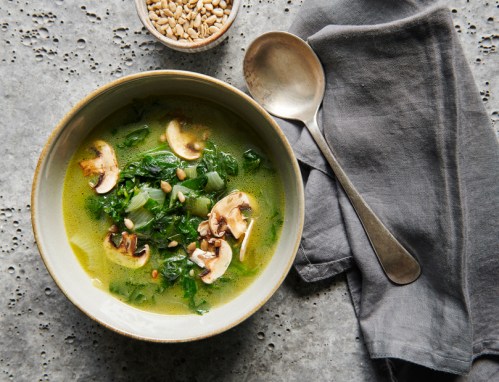5 Vegetables That Are Sneakily Packed With Plant-Based Protein (And How To Eat More of Them)
Tofu and beans aren't the only sources of vegan protein. These high protein vegetables will help plant-based eaters up their protein intake.

When we think of vegan protein sources, we automatically pivot to tofu, beans, nuts, and Beyond Burgers. All are excellent options, but there’s so much more to the plant-based protein picture.
Experts in This Article
a registered dietitian
Vegetables can provide you with this valuable nutrient, too. A bunch of broccoli rabe, for example, has almost as much protein as three eggs (17g), which is more than a third of the recommended daily amount of protein for the average woman. This is great news, as protein protects our bones, gives us energy, helps our bodies recover after workouts (and builds muscle during them), and assists in vital bodily functions. And as we get older, protein becomes even more important.
“As we age, our muscles gradually get weaker and our bones become frail leading to muscle wasting and fractures, which can drastically decrease your quality of life,” Brigitte Zeitlin, RD, founder of BZ Nutrition previously told Well+Good. “Maintaining a good amount of protein in your diet much earlier on, starting in your 20s, helps to prevent all that weakening and decompensating from happening.”
So, how much protein is ideal to consume daily? Everyone’s needs are different, and they’re impacted by one’s height, weight, level of activity, age, and so much more. In general, the recommended daily allowance (RDA) is determined using the following equation: 0.36 grams of protein multiplied by pounds of body weight. (As an example, a 130 pound person needs roughly 47 grams of protein per day.)
Studies have shown that most of us are getting more than enough protein in our diets, but if you’re getting all of yours from vegan foods, Janine Whiteson, MS, RD, says that you might want to consider diversifying and introducing new sources of plant-based protein into your meals. “Plant proteins are generally harder to digest and are absorbed into the body more slowly,” explains Whiteson. This is because plant-based proteins are not always considered complete protein sources, which refers to foods that contain all nine essential amino acids. “Basically, your body can typically absorb more of what it needs and at a quicker rate from animal protein, which is considered complete protein.”
Bottom line? If you’re looking for a healthy vegan source of protein to pair with your beans, nuts, and soy-based burgers—or you’re concerned you might be protein deficient—keep reading for high protein vegetables to start noshing on.
5 high protein vegetables that will help vegans (and carnivores) up their intake of plant-based protein
1. Green peas: 1 cup has 8.5 grams of protein
Peas are loaded with protein and are also a great source of fiber: seven grams per cup, or 30 percent of what most women need for the day. “Protein-packed peas are used in loads of protein supplements, but why have supplements when you can make one of these super delicious recipes using them?” asks Whiteson, who suggests taking a break from avocado toast and opting for mashed pea toast with olive oil and a squeeze of lemon instead.
2. Mushrooms: 2 cups raw or 1 cup cooked has 4.4 grams of protein
Mushrooms are higher in protein than many other vegetables, but it’s important to note that they’re not technically a vegetable; rather, mushrooms are a form of fungi. “Not only do they have a good amount of protein, but mushrooms also contain vitamin D,” says Whiteson. Vitamin D is notoriously challenging to obtain through food sources, which is why Whiteson strongly recommends piling your plate with a variety of ‘shrooms. “Try to buy all different types of mushrooms and do a simple sauté with olive oil and a few drops of coconut aminos. Cook until most of the water has evaporated. Put on toast, add to your salads, omelets, or pasta dishes.”
3. Artichokes: 1 1/2 cups has 4 grams of protein
Artichokes are jam-packed with protein and fiber, making them a nutrition powerhouse that will keep you feeling full longer. “I buy them frozen and add them to soups, stews, dips, or roast them with a little olive oil,” says Whiteson.
4. Spinach: 1 cup cooked has 5.3 grams of protein
“Surprise, surprise, spinach is high in protein—Popeye was right,” Whiteson muses. Spinach is also packed with other important nutrients, including vitamin A, vitamin K, and vitamin C. “I like it fresh when available, but I also love cooking with frozen spinach as I can use it in most anything: eggs, pasta dishes, soups, smoothies, you name it. In our house, we love sauteed spinach in garlic and olive oil.” And don’t forget the high amount of fiber it packs, too.
5. Nutritional Yeast: 2 tablespoons have 6 grams of protein
Nutritional yeast is an inactive, dry form of saccharomyces cerevisiae, a species of yeast. While not technically a vegetable, it’s a delicious vegan source of complete protein and pairs perfectly with any roasted veggie, making a sprinkle of these golden flakes a super simple way to increase the amount of plant-based protein of your meal. “Studies have shown nutrition yeast has benefits ranging from lowering cholesterol to protecting the body from free radical damage,” says Whiteson. “Nutritional yeast can be sprinkled over popcorn or pasta, stirred into soups for added savory flavor, or used as a ‘cheese’ flavoring in vegan sauces.” It’s healthy, versatile, and the umami-rich flavor of ‘nooch’ tastes similar to parmesan cheese (sans dairy).
Oh hi! You look like someone who loves free workouts, discounts for cutting-edge wellness brands, and exclusive Well+Good content. Sign up for Well+, our online community of wellness insiders, and unlock your rewards instantly.
Sign Up for Our Daily Newsletter
Get all the latest in wellness, trends, food, fitness, beauty, and more delivered right to your inbox.
Got it, you've been added to our email list.










